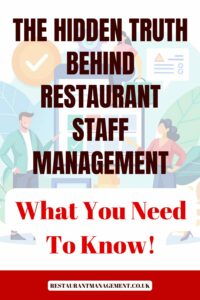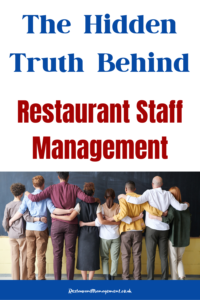Updated: 19 July 2024
Restaurant Staff Management Strategies
If you’re running a restaurant, you know that your staff is the backbone of your business. Your restaurant staff management strategies are responsible for providing great customer service, preparing delicious food, and ensuring that your customers have a positive experience. To run a successful restaurant, you need to have a team of well-trained and motivated staff. In this article, we’ll discuss some effective strategies for managing your restaurant staff.
1. Develop a Comprehensive Staff Training Program
Developing a comprehensive staff training program is one of the most important things you can do to ensure that your restaurant staff is well-prepared to handle any situation that may arise. Your training program should cover all aspects of your restaurant operations, from front-of-house to back-of-house.
One key aspect of your training program should be customer service. Your staff should be trained in how to greet customers and make them feel welcome. They should also be trained in how to handle customer complaints and difficult situations, such as long wait times or incorrect orders.
Another important area of training is food safety and proper sanitation procedures. Your staff should be trained in how to properly store, prepare, and serve food to ensure that it is safe and free from contamination. This includes things like hand washing, wearing gloves and hairnets, and properly cleaning and sanitising kitchen equipment.
In addition to food safety, your staff should be trained in the proper techniques for preparing food, handling cash and credit cards, and using the POS system. They should also be trained in how to handle difficult customers, such as those who are angry or upset.
Overall, your staff training program should be comprehensive and cover all aspects of your restaurant operations. By investing in your staff’s training and development, you can ensure that they are well-prepared to provide excellent customer service and deliver a high-quality dining experience to your customers.

2. Create Clear Job Descriptions
Creating clear job descriptions for each of your staff members is crucial in creating effective restaurant staff management strategies. By outlining each staff member’s duties and responsibilities, you can ensure that everyone understands their role and is working towards the same goals. This can help to avoid confusion and ensure that all tasks are completed in a timely and efficient manner.
For example, if you have a server, their job description may include duties such as taking customer orders, serving food and drinks, and handling payments. If you have a cook, their job description may include duties such as preparing and cooking food, keeping the kitchen clean and organised, and ensuring that all food is prepared to the highest standards.
It’s important to note that job descriptions should be clear, concise, and easy to understand. They should also be tailored to each individual staff member’s role and responsibilities. For example, a job description for a dishwasher may be different from a job description for a prep cook.
Creating clear job descriptions can also help you to identify areas where additional training may be needed. For example, if a server is responsible for taking customer orders but is struggling with the POS system, you may need to provide additional training to help them become more proficient.
Overall, creating clear job descriptions is an important part of effective restaurant staff management. By ensuring that everyone understands their role and responsibilities, you can help to create a more efficient and productive work environment.

3. Implement a Performance Management System
Implementing a performance management system is a great step towards ensuring the success of your restaurant. This system allows you to monitor your employees’ performance and provide them with regular feedback to help them improve their skills and productivity. The process of implementing a restaurant performance management system involves setting clear performance expectations, establishing performance goals, and regularly evaluating employee performance.
To begin, it’s important to set clear performance expectations for your staff. This can be achieved by defining job descriptions, outlining responsibilities, and clarifying the goals and objectives of the organisation. By doing so, your employees will know what is expected of them and what they need to achieve to succeed in their roles.
Next, you need to establish performance goals for your staff. These goals should be specific, measurable, achievable, relevant, and time-bound. By setting clear goals, your employees will have a clear understanding of what they need to accomplish, and you can measure their progress towards achieving those goals.
Once performance expectations and goals have been established, you can then begin to regularly evaluate your employees’ performance. This evaluation process can take many forms, such as self-assessments, peer reviews, or manager evaluations. Regardless of the form, the evaluation process should be constructive, objective, and focused on identifying areas for improvement.
Implementing a performance management system is essential for restaurant staff management to ensure the success of your organisation. By setting clear performance expectations, establishing performance goals, and regularly evaluating employee performance, you can provide your employees with the feedback and support they need to grow and develop. You would provide your employees with the feedback and support they need to improve their skills and productivity.
Regular performance evaluations can also help to increase employee engagement, and job satisfaction, and reduce turnover. For example, if an employee is struggling in a particular area, you can identify the issue through the performance management system and provide them with the necessary training or support to improve their performance which in turn, can help to increase job satisfaction and reduce turnover.
Happy Restaurant Staff: 20 Tips On How To Make Your Employees Happy
4. Schedule Staff Effectively
Effective staff scheduling is a great component of your restaurant staff management strategies. You need to ensure that you have enough staff on hand to handle peak hours, while also keeping labour costs in check. There are several strategies you can use to schedule staff effectively.
One effective strategy is to use scheduling software. This software allows you to create schedules based on anticipated demand, taking into account factors such as seasonality and special events. This can help you to ensure that you have the right number of staff on hand at all times, without over or understaffing.
Another strategy is to communicate with your staff regularly about their availability and scheduling preferences. This can help you to create schedules that work for everyone, and can also help to ensure that your staff is motivated and engaged in their work.
It’s also important to consider factors such as overtime and break times when scheduling your staff. By ensuring that your staff is taking the appropriate breaks and not working excessive hours, you can help to create a more positive and productive work environment.
Ultimately, effective staff scheduling requires a balance between meeting customer demand and controlling labour costs. By using scheduling software, communicating with your staff, and taking into account factors such as overtime and break times, you can create schedules that work for everyone and help to improve overall staff performance.

5. Communicate Effectively
Clear and effective communication is essential to manage your restaurant staff effectively. Without it, there can be confusion, misunderstandings, and ultimately, poor performance. To ensure effective communication with your staff, there are a few things you can do.
One important strategy is to hold regular staff meetings. These meetings should be used to communicate important information, such as changes in menu items, new policies or procedures, or upcoming events. They can also be used to provide feedback and support to your staff, helping them to improve their performance and stay motivated.
In addition to staff meetings, it’s important to provide ongoing feedback to your staff. This can include both positive feedback, such as praising an employee for a job well done, and constructive feedback, such as addressing areas for improvement. By providing feedback regularly, you can help to keep your staff motivated and engaged in their work.
Another key aspect of effective communication is being open and approachable. Your staff should feel comfortable coming to you with questions, concerns, or ideas. This can help to create a more collaborative and productive work environment, and can also help you to identify and address issues before they become bigger problems.
Overall, effective communication requires consistent effort and attention. By holding regular staff meetings, providing feedback, and being open and approachable, you can create a positive and productive work environment that supports the success of your restaurant and your staff.
How To Make Sure Your Restaurant Staff Are Happy and Productive
6. Offer Incentives and Rewards
Offering incentives and rewards is a great way to keep your employees motivated and engaged. It is important to understand what motivates your staff and what they value, so you can tailor your rewards to their preferences. For example, some employees may value financial rewards, such as bonuses or gift cards, while others may value more time off or the opportunity for career growth and development.
In addition to traditional financial incentives, offering opportunities for career advancement and professional development can also be a powerful motivator for many employees. This could include things like offering training programs, mentoring opportunities, or opportunities to work on special projects. By investing in your employee’s professional growth, you are showing that you value their contributions and are committed to helping them achieve their career goals.
It is important to note that incentives and rewards should be offered fairly and consistently to all employees. Employees will quickly become disengaged if they feel that rewards are being handed out unfairly or if some employees are receiving preferential treatment. To avoid this, it is important to have clear criteria and processes in place for determining who is eligible for rewards and how they will be distributed.
Overall, offering incentives and rewards can be an effective way to motivate your staff and keep them engaged. By understanding what motivates your employees and offering a range of rewards and opportunities for growth and development, you can help to build a culture of engagement and high performance within your organisation.

7. Foster a Positive Work Environment
Fostering a positive work environment is essential for effective restaurant staff management. When your staff feels happy and supported, they are more likely to perform well, provide excellent service, and remain loyal to your restaurant. Here are a few strategies you can use to create a positive work environment:
One important strategy is to promote a culture of teamwork and collaboration. This means encouraging your staff to work together and support one another, rather than competing or working in silos. You can promote teamwork by assigning group projects, providing opportunities for cross-training, and recognising and rewarding collaborative efforts.
Another effective strategy is to provide opportunities for socialising and team building. This can include organising outings or events outside of work, such as team dinners or volunteer activities. These opportunities can help your staff to build relationships, develop trust, and foster a sense of camaraderie.
It’s also important to ensure that everyone feels valued and respected. This can include recognising and rewarding good performance, providing opportunities for professional development, and addressing any issues or concerns that may arise in a timely and respectful manner.
As a restaurant manager, it’s important to lead by example. You set the tone for the rest of the staff. By demonstrating positive behaviours, such as being respectful, supportive, and collaborative, you can help to create a positive work environment for your staff.
Fostering a positive work environment requires a combination of strategies, including promoting teamwork and collaboration, providing opportunities for socialising and team building, ensuring that everyone feels valued and respected, and leading by example. By creating a positive work environment, you can help to ensure the success of your restaurant and your staff.
8. Utilise Technology
In today’s digital age, technology is becoming an increasingly important tool in managing restaurant staff. One effective solution is scheduling software, which allows you to easily create schedules based on anticipated demand, availability of staff, and other factors. This can help to ensure that you have enough staff on hand during peak hours without over-scheduling, which can result in unnecessary labour costs.
Another useful technology solution is a point-of-sale (POS) system. This can help to improve order accuracy and speed up the ordering process, which can lead to increased customer satisfaction and higher sales. Many POS systems also offer features such as inventory management and reporting, which can help you to make informed decisions about your business.
Online training programs are another effective technology solution. These can help you to provide consistent training to all staff members, regardless of their location or schedule. They can also help to reduce training costs and ensure that staff members are properly trained in important areas such as food safety and sanitation.
By utilising technology solutions like scheduling software, POS systems, and online training programs, you can improve your overall efficiency, reduce labour costs, and provide better service to your customers. However, it is important to carefully evaluate and choose the right technology solutions for your specific needs and goals.

9. Address Issues Quickly and Effectively
Addressing issues quickly and effectively is a crucial aspect of managing your restaurant staff. Failure to do so can result in low morale and decreased productivity. The first step in addressing issues is to identify them. This could be done through regular check-ins with staff or by monitoring their performance. Once an issue is identified, it’s important to act quickly before it becomes a bigger problem.
One effective strategy for addressing issues is through conflict resolution. This involves meeting with the parties involved to identify the root cause of the issue and work towards a solution. Conflict resolution requires good communication skills and the ability to remain impartial. It’s important to listen to both sides of the story and work towards a compromise that is acceptable to everyone.
In some cases, disciplinary action may be necessary. This could include a verbal warning, written warning, suspension, or termination. It’s important to follow a clear process for disciplinary action to ensure that it’s fair and consistent. Additionally, it’s important to document all instances of disciplinary action in case of legal disputes.
In some cases, additional training may be necessary to address performance issues. This could include training in customer service, food preparation, or communication skills. Providing additional training shows your staff that you are invested in their success and want to help them improve.
By addressing issues quickly and effectively, you can create a positive work environment where your staff feels supported and motivated to perform their best.
Exploring Future Trends and Considerations in the UK Restaurant Industry
10. Provide Regular Feedback
Providing regular feedback to your staff is an important part of managing them effectively. By doing so, you can help them to understand what they are doing well and where they need to improve. Regular feedback can help your staff to stay motivated and engaged, and it can also help to improve overall performance.
One effective way to provide regular feedback is through performance reviews. These can be conducted on a regular basis, such as once a quarter or once a year, and can help to identify areas for improvement as well as strengths to build upon. During performance reviews, it’s important to provide specific feedback on areas such as customer service skills, teamwork, and job responsibilities.
In addition to formal performance reviews, it’s also important to have regular one-on-one meetings with your staff. These meetings can provide an opportunity for your staff to discuss any issues or concerns they may have, as well as to receive feedback on their performance. One-on-one meetings can be conducted on a regular basis, such as once a month, and can help to build trust and rapport between you and your staff.
Finally, it’s also important to provide informal feedback on a regular basis. This could include things like praising staff for a job well done or offering suggestions for improvement in a non-threatening way. By providing regular feedback in a positive and constructive way, you can help your staff feel valued and supported, and ensure that they are meeting your expectations.
Conclusion
Creating an effective Restaurant Staff Management Strategy involves comprehensive training, clear communication, efficient scheduling, and timely issue resolution. By implementing these strategies and fostering a positive work environment, you can improve staff performance and drive business success.
Related articles:
Restaurant Management Tips For Success
How To Make Sure Your Restaurant Staff Are Happy and Productive
Restaurant Management Structure
FAQ’S (Frequently Asked Questions And Answers)
How do you manage a team in a restaurant?
Managing a team in a restaurant requires strong leadership, effective communication, and the ability to delegate tasks efficiently. Start by setting clear expectations and goals for each team member. Create an amazing work atmosphere by providing consistent feedback and showing appreciation for your team’s hard work. Implement regular training sessions to ensure staff is well-versed in menu items, service standards, and safety protocols. Get everyone working together by having team get-togethers and ensuring there are chances for the staff to discuss their ideas and figure things out together. Finally, lead by example, demonstrating professionalism, respect, and a strong work ethic.
What does staff management do?
Staff management involves overseeing and coordinating employees’ activities to ensure the smooth operation of a business. In a restaurant, this includes hiring and training staff, scheduling shifts, assigning tasks, and monitoring performance. Effective staff management ensures that employees are motivated, productive, and provide excellent customer service. It also involves addressing any issues or conflicts that arise, maintaining a positive work environment, and ensuring compliance with labour laws and health regulations.
What is the management structure of a restaurant?
The way a restaurant is run involves several key roles. At the top is the owner or general manager, who is responsible for overall operations and strategic decisions. Reporting to them are managers for different areas, such as the front of house (FOH) manager who oversees customer service and waitstaff, and the back of house (BOH) manager who supervises the kitchen staff. Additionally, there may be assistant managers, shift supervisors, and team leaders who help with daily operations and ensure that specific tasks and goals are met.
What is the management of a restaurant?
Restaurant management encompasses planning, organising, and overseeing all aspects of restaurant operations, including staffing, training, budgeting, menu planning, inventory management, marketing, and customer service. Effective restaurant management ensures that the establishment runs efficiently, provides high-quality food and service, meets financial goals, and complies with health and safety regulations. It also involves creating a positive customer dining experience and a productive work environment for staff.

Who is the most important part of your staff in a restaurant?
While every staff member plays a crucial role in a restaurant’s success, the most important part is often considered to be the front-of-house employees, including servers and hosts. These individuals have direct contact with customers and significantly influence their dining experience. However, kitchen staff, including chefs and line cooks, are equally important as they ensure the quality and consistency of the food. Ultimately, a restaurant’s success depends on the combined efforts of both front-of-house and back-of-house teams.
How stressful is being a restaurant manager?
Being a restaurant manager is highly stressful due to the fast-paced and demanding nature of the job. Managers must handle multiple responsibilities, such as overseeing staff, managing inventory, dealing with customer complaints, and ensuring smooth operations. They often work long hours, including nights, weekends, and holidays. The pressure to maintain high standards of service and profitability can be intense. However, strong organisational skills, effective stress management techniques, and a passion for the industry can help mitigate the stress and lead to a rewarding career.
How can you be a great general manager of a restaurant?
To be a great general manager of a restaurant:
- Concentrate on building robust leadership and communication skills.
- Build a cohesive team by hiring the right people, providing thorough training, and fostering a positive work environment.
- Stay organised and efficient in managing daily operations, including scheduling, inventory, and budgeting.
- Prioritise customer satisfaction by ensuring high standards of service and quality.
- Continuously seek feedback from staff and customers to identify areas for improvement.
- Stay adaptable and proactive in addressing challenges and changes in the industry.


